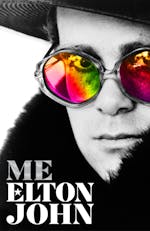one
It was my mum who introduced me to Elvis Presley. Every Friday, after work, she would pick up her wages, stop off on the way home at Siever’s, an electrical store that also sold records, and buy a new 78. It was my favourite time of the week, waiting at home to see what she would bring back. She loved going out dancing, so she liked big band music – Billy May and His Orchestra, Ted Heath – and she loved American vocalists: Johnnie Ray, Frankie Laine, Nat King Cole, Guy Mitchell singing ‘she wears red feathers and a huly-huly skirt’. But one Friday she came home with something else. She told me she’d never heard anything like it before, but it was so fantastic she had to buy it. As soon as she said the words Elvis Presley, I recognized them. The previous weekend I’d been looking through the magazines in the local barber shop while I was waiting to have my hair cut, when I came across a photo of the most bizarre-looking man I’d ever seen. Everything about him looked extraordinary: his clothes, his hair, even the way he was standing. Compared to the people you could see outside the barber shop window in the north-west London suburb of Pinner, he might as well have been bright green with antennae sticking out of his forehead. I’d been so transfixed I hadn’t even bothered to read the accompanying article, and by the time I got home I’d forgotten his name. But that was it: Elvis Presley.
As soon as Mum put the record on, it became apparent that Elvis Presley sounded the way he looked, like he came from another planet. Compared to the stuff my parents normally listened to, ‘Heartbreak Hotel’ barely qualified as music at all, an opinion my father would continue to expound upon at great length over the coming years. I’d already heard rock and roll – ‘Rock Around The Clock’ had been a big hit earlier in 1956 – but ‘Heartbreak Hotel’ didn’t sound anything like that either. It was raw and sparse and slow and eerie. Everything was drenched in this weird echo. You could barely understand a word he was singing: I got that his baby had left him, after that I completely lost the thread. What was a ‘dess clurk’? Who was this ‘Bidder Sir Lonely’ he kept mentioning?
It didn’t matter what he was saying, because something almost physical happened while he was singing. You could literally feel this strange energy he was giving off, like it was contagious, like it was coming out of the radiogram speaker straight into your body. I already thought of myself as music mad – I even had a little collection of my own 78s, paid for with record tokens and postal orders I got on birthdays and at Christmas. Until that moment, my hero had been Winifred Atwell, a big, immensely jolly Trinidadian lady who performed onstage with two pianos – a baby grand on which she played light classical and a battered old upright for ragtime and pub songs. I loved her sense of glee, the slightly camp way she would announce, ‘And now, I’m going to my other piano’; the way she would lean back and look at the audience with a huge grin on her face while she was playing, like she was having the best time in the world. I thought Winifred Atwell was fabulous, but I’d never experienced anything like this while listening to her. I’d never experienced anything like this in my life. As ‘Heartbreak Hotel’ played, it felt like something had changed, that nothing could really be the same again. As it turned out, something had, and nothing was.
And thank God, because the world needed changing. I grew up in fifties Britain and, before Elvis, before rock and roll, fifties Britain was a pretty grim place. I didn’t mind living in Pinner – I’ve never been one of those rock stars who was motivated by a burning desire to escape the suburbs, I quite liked it there – but the whole country was in a bad place. It was furtive and fearful and judgemental. It was a world of people peeping around their curtains with sour expressions, of girls being sent away because they’d Got Into Trouble. When I think of fifties Britain, I think of sitting on the stairs of our house, listening to my mum’s brother, Uncle Reg, trying to talk her out of getting divorced from my dad: ‘You can’t get divorced! What will people think?’ At one point, I distinctly remember him using the phrase ‘what will the neighbours say?’ It wasn’t Uncle Reg’s fault. That was just the mindset of the times: that happiness was somehow less important than keeping up appearances.
The truth is that my parents should never have got married in the first place. I was born in 1947, but I was effectively a war baby. I must have been conceived while my father was on leave from the RAF – he had joined up in 1942 at the height of World War Two and elected to stay on after the war ended. And my parents were definitely a war couple. Their story sounds romantic. They met the same year my dad joined up. He was seventeen, and had worked in a boatbuilding yard in Rickmansworth that specialized in making narrowboats for canals. Mum was sixteen, her maiden name was Harris, and she delivered milk for United Dairies on a horse and cart, the kind of job a woman would never have done before the war. My dad was a keen amateur trumpet player, and while he was on leave, he apparently spotted my mum in the audience while he was sitting in with a band playing at a North Harrow hotel.
Copyright © 2019 by HST Global Limited





